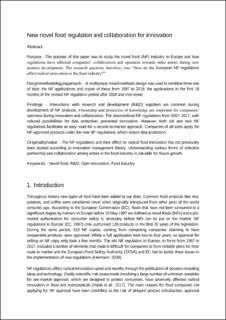| dc.contributor.author | Grimsby, Gard Sveinung | |
| dc.date.accessioned | 2021-02-15T12:43:44Z | |
| dc.date.available | 2021-02-15T12:43:44Z | |
| dc.date.created | 2020-08-25T10:09:17Z | |
| dc.date.issued | 2020 | |
| dc.identifier.citation | British Food Journal. 2020, 123 (1), 245-259. | |
| dc.identifier.issn | 0007-070X | |
| dc.identifier.uri | https://hdl.handle.net/11250/2728107 | |
| dc.description.abstract | Purpose The purpose of this paper was to study the novel food (NF) industry in Europe and how regulations have affected companies' collaboration and openness towards other actors during new product development. The research question, therefore, was “How do the European NF regulations affect radical innovation in the food industry?”. Design/methodology/approach A multiphase mixed-methods design was used to combine three sets of data as follows: the NF applications and copies of these from 1997 to 2018; the applications in the first 18 months of the revised NF regulation period after 2018 and interviews with six NF applicant companies and seven experts on NF. Findings Interactions with research and development (R&D) suppliers appear to be common during development of NF products for companies of all sizes. Ownership of knowledge and a conscious intellectual property rights strategy are important for companies' openness during radical innovation and collaboration. The decentralised NF regulations from 1997 to 2017, with reduced possibilities for data protection, prevented innovation. However, both old and new NF regulations facilitate easy routes for second-to-market approach. Companies of all sizes apply for NF-approved products under the new NF regulations, which ensure data protection. Practical implications Future NF pioneers, food R&D suppliers and food-industry policymakers will benefit from open innovation and NF insights by gaining an understanding of NF regulations and insight into how a policy with open governance affects collaboration and co-creation. Originality/value The NF regulations and their effect on radical food innovation have not previously been studied according to innovation management theory. Understanding various forms of selective partnership and collaboration among actors in the food industry is valuable for future growth. | |
| dc.language.iso | eng | |
| dc.subject | Matindustri | |
| dc.subject | Food industry | |
| dc.subject | Novel food | |
| dc.subject | Novel food | |
| dc.subject | Open innovation | |
| dc.subject | Open innovation | |
| dc.title | New novel food regulation and collaboration for innovation | |
| dc.type | Peer reviewed | |
| dc.type | Journal article | |
| dc.description.version | acceptedVersion | |
| dc.source.pagenumber | 245-259 | |
| dc.source.volume | 123 | |
| dc.source.journal | British Food Journal | |
| dc.source.issue | 1 | |
| dc.identifier.doi | 10.1108/BFJ-02-2020-0154 | |
| dc.identifier.cristin | 1824943 | |
| dc.relation.project | Nofima AS: 12307 | |
| dc.relation.project | Nofima AS: 201703 | |
| dc.relation.project | Norges forskningsråd: 281106 | |
| dc.relation.project | Norges forskningsråd: 262303 | |
| cristin.ispublished | true | |
| cristin.fulltext | postprint | |
| cristin.qualitycode | 1 | |
